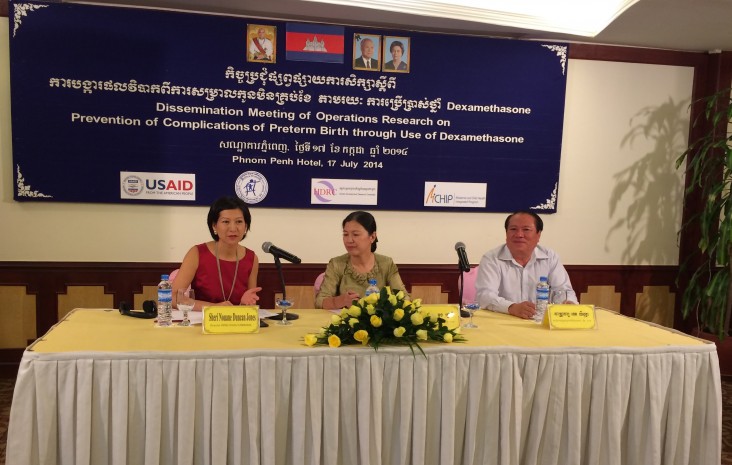
Professor Tung Rathavy, Director of National Maternal and Child Health Centre
Distinguished colleagues, ladies and gentlemen
It is my great pleasure to join you this morning to say a few words to open this important workshop.
Let me start by thanking the officials of the National Maternal and Child Health Centre and our colleagues from the USAID-funded Maternal and Child Health Integrated Program for making this research possible and organising this important event to share the results. I must also recognize the vital role and contributions of the public sector health providers – doctors, midwives, and all who support them – who work each day to protect the health and safety of Cambodia’s mothers and newborns in health facilities across the country.
In my short time in Cambodia I have learned much about the phenomenal progress the country has made in improving maternal and child health. Even before I arrived, I was aware that Ministry officials have been recognized internationally in recent years for Cambodia’s success in improving maternal and child health. In fact, Cambodian representatives have been asked to share Cambodia’s experience in international conferences so that other countries may learn from its success.
As an example, Professor Keth Lysotha (KET LEE-SOTA) graciously accepted a request to attend an international conference in Johannesburg last year to share Cambodia's success in increasing facility-based deliveries in recent years. Thank you, Professor, for your effort and support, leading this study from beginning to the end.
Cambodia has made substantial progress towards achieving its Millennium Development Goals, including reaching the targets for Goals 4 and 5 years ahead of the target dates. I would like to congratulate the Royal Government of Cambodia, in particular the Ministry of Health, for its leadership in these efforts. The deployment of midwives to all health facilities and the endorsement of the midwifery incentive scheme are recognized as driving forces behind this great success.
In spite of this great success, there remains much to be done. For every 1,000 live births in Cambodia, 27 babies do not survive the first month of life. One of the main contributing factors behind these newborn deaths continues to be premature birth and related complications. But as we will discuss today, we have the tools and the know-how to help prevent pre-term complications and reduce newborn mortality. When applied correctly and consistently, antenatal corticosteroids are one of the interventions proven to reduce newborn mortality by preventing preterm complications.
Today we will share lessons learned from a recent study to improve the utilization of antenatal corticosteroids. The study produced excellent results thanks to a combination of strong technical leadership and participation from health facility staff. Our colleague, Dr. Jeffrey Smith, the Maternal Health Director of MCHIP, will present the specific results of the study today, including recommended actions to be considered for scale-up. These results have tremendous implications for reducing newborn mortality, a major priority for the Ministry of Health, USAID, and all the other stakeholders joining us here today.
We hope today’s workshop will be fruitful and productive – resulting in improved practices for application of antenatal corticosteroids and the lives of many babies saved in the near future. USAID stands ready to assist in these efforts.
Thank you.
Related Speeches
- Remarks by Polly Dunford, Mission Director, USAID Cambodia, Launch Event of Feed the Future Cambodia Harvest II
- Remarks by Christina Lau, Deputy Director, Office of Public Health and Education, USAID/Cambodia, Opening Ceremony of the Kick-Off Workshop for “One Health Workforce”
- Remarks by Veena Reddy, Deputy Mission Director, USAID Cambodia, EPIC Showcase







Comment
Make a general inquiry or suggest an improvement.